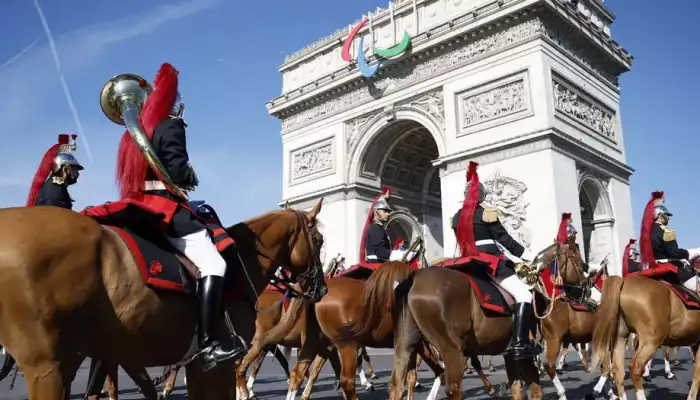
France celebrates its national holiday, Bastille Day, on Sunday as the country prepares to host the Olympic Games. President Emmanuel Macron opened the traditional military parade by reviewing the troops, followed by the Marseillaise, the national anthem.
Preparations for the Games have blocked the military parade from its traditional route on the Champs Elysees, forcing a military contingent to march on the nearby Avenue Foch instead.
Due to Olympic security measures, the number of troops were reduced compared to previous years. Some 4,000 people, down from 6,500 last year, and 162 horses marched in the tightly choreographed show. No tanks or armored vehicles took part, but overhead more than 60 aircraft flew in formation, including a British Typhoon fighter alongside French Mirages and Rafales.What is special about this year's parade?
This year's parade didn't feature a foreign guest like last year's visit by Indian Prime Minister Narendra Modi, but it did have a very special participant: the Olympic flame. Just 12 days before the start of the Summer Games, the torch relay reached the French capital.
Colonel Thibault Vallette, of the elite Cadre Noir de Saumur cavalry school and Rio 2016 equestrian gold medalist, carried the torch. He then passed it on to a group of young athletes to carry it around the capital.
After its Bastille Day appearance, the torch relay will visit Notre Dame Cathedral, the historic Sorbonne University and the Louvre Museum. It will then move on to other Paris landmarks on Monday.Festivities come amid political crisis due to snap vote
This year's Bastille Day celebrations offer Macron a moment of distraction from the political turmoil he unleashed with a snap election that weakened his centrist party and his presidency. The result left the country with a deadlocked parliament and no one clearly in charge.
The leftist alliance that won the most seats is struggling to agree on a candidate to replace Prime Minister Gabriel Attal, who could leave within days. There is little sign of a ruling majority emerging from parliament, which is split into three loose camps. Meanwhile, Macron is barred by the constitution from calling new elections for a period of 12 months.
As a result, the European Union's second-largest economy, a nuclear-armed G7 power and a permanent member of the UN Security Council, is rudderless. This is a worrying situation for markets and for France's allies alike.On July 14, 1789, revolutionaries stormed the Bastille fortress and prison in Paris, marking the beginning of the French Revolution and the end of the monarchy.
The holiday is central to the French calendar, with events held throughout the country. It aims to embody the national motto of "liberty, equality and fraternity."